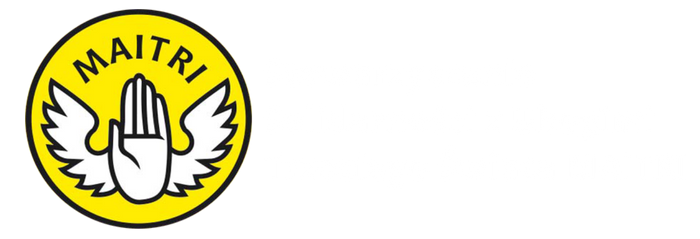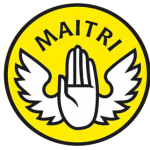
About Maitri Movement
Who we are?
Who we are?
MAITRI Movement in brief – the mission, goals and activities. MAITRI Movement – full name: The Movement of Solidarity with the Poor of the Third World MAITRI remains a federation of ordinary people’s communities working together to provide a support to those living in very poor economic conditions of the developing countries.
1975 marks the beginning of the first formation. It has been then set up by a student Jacek Wójcik who stopped by the Missionaries of Charity Centre in Calcutta during his travels in India and decided to volunteer there, inspired by the journey of Mother Teresa and the work of her congregation.
The constitution of our movement says that MAITRI Movement mission is expressed through the acts of love and care towards the poorest. The members of the community respond to their obstacles, as they believe, by answering the God’s call. They are inspired and led by the example of Mother Teresa and Saint Francis of Assisi but mainly of Jesus Christ.
The word “maitri” was adopted from Sanskrit – India’s ancient language. Contemporary meaning is a brotherhood, friendship.
The values we follow
The values shared by our participants are derived from the Bible Gospels and are consistent with those outlined in our constitution. We believe that the “Maitri” grows through those who:
- limit their expenses and needs in everyday life and share with those living in very poor economic conditions of the developing world;
- respect the dignity of those they help and look for the ways of getting closer to them;
- define the help they offer as a gift of a pure heart;
- promote equality;
- increase awareness of the situation that people of Third World are in, through their actions, statements and the attitude towards life.
Our statutory goals:
- to bring an aid to the poorest people of the developing countries;
- to raise people’s awareness about the struggles of the poorest and their rights to live in dignity;
- to look for the ways of connecting people from different economic backgrounds.
MAITRI Movement communities
MAITRI movement consists of the local parish communities which became the base of its organisational structure. According to MAITRI Movement constitution, the local community follows and promotes the mission through an increase of society awareness of the current situation in developing countries and constant support to the poorest. The main goal is the promotion of MAITRI values and advocacy for people in need. In the beginning of 2017, there were already ten active parish communities in Poland in the following cities: Białystok, Bytom, Gdańsk, Gliwice, Lublin, Poznań, Racibórz, Toruń, Warszawa and Wrocław. We also have local structures in the Czech Republic. You can find additional information in the activities reports.
The Board of our Movement consists of persons responsible for the local parish communities who oversee and monitor their formation and operations. Chairman of the Board is elected by its members and represents them with the church authorities. MAITRI Movement is also one of the founding members of the “Polish Council of Catholic Associations”.
The National Chaplains
One of the most prominent figures in the history of our organisation is the late Father Dr Roman Forycki. He was nominated as the National Chaplain of Maitri in 1989 by the Episcopacy of Poland and was heavily involved, for over 20 years, in the development of the community and establishing its purpose and regulations. Under his supervision, the organisation has received its legal status in 2003. The second National Chaplain function was performed by Father Jan Jacek Stefanów SVD between 2011 and 2016 and since 2017 by Father Dr Andrzej Panasiuk.
Core activities
“Have a Heart Adoption” is currently one of the most important schemes run by our organisation. The programme, initiated in 1996 is a long-term, individual or group sponsorship of orphans or just very poor children, living in developing countries of Africa. You will be provided with the name of the child you decided to sponsor as well as with the information where your money goes. All the funds are passed on to the children through the Polish missionaries or local priests or nuns who in return provide the sponsors with the photos of the children and other details helping to establish the correspondence between them. In Poland, the programme is coordinated by the office in Gdańsk, the initiative is also carried out in the Czech Republic.
During the 20 years of the programme, we have managed to help more than 5,000 children, apart from approx. 3,500 children that are receiving the support from us at present. We helped 20 young people to become priests and right now we are helping 23 seminary students. Maitri “Have a Heart Adoption” was the first scheme of this kind available in Poland. It became a source of inspiration to many other charity organisations and religious orders.
An aid for a health and nutrition centres in Africa
We support also missionary health centres who provide food to malnourished children as well as medical assistance. We help a dozen centres on a regular basis. The centres are located in the following countries: Rwanda, DR Congo, Burundi, Cameroun, RCA. Long term support covers as well providing the food to nursery schools within Catholic missionary centres. One-time sponsorships help to finance medicine, medical equipment for missionary health centres, infrastructure development to ensure communities have access to clean drinking water, construction or extension of existing schools and health centres, purchase of the 4×4 vehicles for the missionaries (so far we have purchased 5) etc. See the list of completed projects. Our aid reaches 53 missionary centres led by 23 different religious orders, including the seminary in Bertoua in Cameroon.
We are committed to bringing a help to all the people in need, regardless of their background or beliefs. We understand that solidarity with the people impacted by poverty is reflected through an ultimate respect towards their equality and dignity as the human being and the rights that flow from it.
The name and the logo of MAITRI Movement
The name and the logo of the Movement are connected with its mission (charism). The full name of the Movement is The Movement of Solidarity with the Poor of the Third World ‘Maitri’. The Movement is a federation of communities of lay people functioning in the parishes of the Catholic Church in several cities of Poland and the Czech Republic.
The meaning of the name of the Movement
‘Solidarity,’ by the teachings of John Paul II, is a Christian virtue tightly connected with love. It embraces all people, starting from the poorest, as the world of suffering calls for solidarity and community. Solidarity encourages lifestyle changes and sharing based on the principle that the created goods should serve all. This spirit of solidarity also means openness to dialogue. ‘We are called to recognize the necessary solidarity of the human family as the fundamental condition of our life together on this earth’ (John Paul II, ‘Message for the Twentieth World Day of Peace’; ‘Sollicitudo rei socialis’).
The word ‘maitri‘ – brotherhood, friendship – was accepted as the Sanskrit word which is the closest in meaning to compassionate love that does not pose any barriers. This word, chosen for the name of the Movement, originates from the language of the people that the Movement’ participants helped from the very beginning. It shows the respect for them as well as for their spiritual and moral, social and cultural goods ‘which […] reflect a ray of that Truth which enlightens all men.’ (see: Declaration on the Relation of the Church to non-Christian religions Nostra Aetate).
‘Maitri -brotherhood’, ‘friendship’ and ‘solidarity’ are two faces of love which reaches its zenith in exchange. As the Holy Father wrote: ‘ In reciprocal relationships between persons merciful love is never a single act or process. […]. We must continually purify all our actions and all our intentions in which mercy is understood and practiced unilaterally, as a good done to others. […] If this bilateral and reciprocal quality is absent, […] there has not yet been fully completed in us that conversion to which Christ has shown us the way by His words and example, even to the cross. (John Paul II, „Dives in Misericordia”,14). ‘Holy,’ ‘mysterious’ and ‘marvelous exchange’ is often appealed to in the Holy Mass Liturgy when our heart directs to the One who is the beginning and the center of this exchange.
Opinion on the word ‘maitri’ written by Father Marian Żelazek SVD
“When, as a missionary in India, I read the word ‘maitri’ for the first time, I was pleasantly surprised. I imagined a group of people aspiring to fulfil their dreams and meet the goals, to tighten the relations with other people basing on respect, understanding, and solidarity. Because ‘maitri’ means love which is reflected in friendship. This word comes from Sanskrit and simply means friendship, brotherhood. Mitro – friend, that’s how I would call a man who I feel close to. When young people from Poland adopted the name ‘maitri’ for their movement, they could not have found a better one. (…). If we wanted to find an adequate word in the vocabulary that is familiar to us – the best would be ‘caritas’. Jesus said: ‘you are my friends’, in Orija language – ‘moro mitro’. (…)”
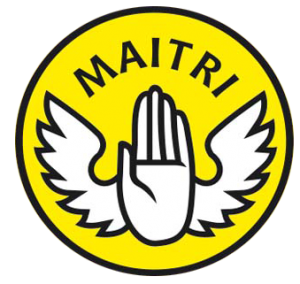
The logo of the movement is a winged hand inside a rim. The first participants of the movement who adopted this sign were inspired by biblical texts in which a winged hand symbolise Divine help and God’s caring presence. ‘ Hide me in the shadow of your wings’, we read in a psalm. The Holy Scripture also speaks about hands of people reached out to the poorest. This logo also symbolises the openness of the participants and the willingness to stretch out a friendly, supportive hand, which is an extension of the good hand of God, offering help to the poor in need.
Our history
The history of MAITRI Movement – how did it happen?
From its origin, the Movement of Solidarity with the Poor of the Third World MAITRI remains a federation of ordinary people’s communities working together to provide support to those living in indigent economic conditions of the developing world.
The beginnings
The year of 1975 marks the start of the first formation. It has been then set up by a student Jacek Wójcik who guided by the late father Bronisław Bozowski, stopped by the Missionaries of Charity Centre of Calcutta during his travels in India and decided to volunteer there, inspired by the journey of St. Mother Teresa and the work of her congregation. This was the foundation of the first group of the Movement.
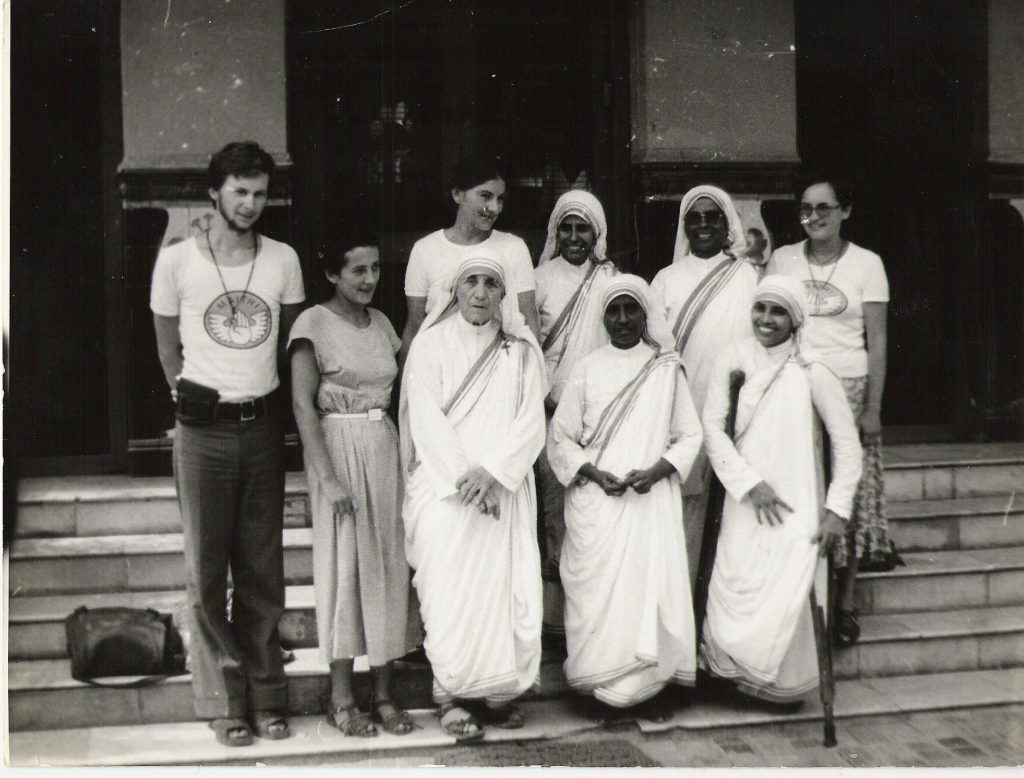
The members of MAITRI Movement in Calcutta. From left: Marek Oktaba, Alicja Misztal. First from the right: Danuta Szczepańska
A few months later, in 1975/76 the “Students Third World Discussion Group” was founded at the Pauline Order Monastery located in Warsaw Old Town on 3 Długa Street and was officially approved by the Bishop of Warsaw. Only a year later, another group was formed in Bytom and at the beginning of 1978, one more in Gdańsk. In the 80’s there were already more than 30 groups up and running throughout Poland with over 300 members. The community started to grow, now under the name of “The Exchange and Reconciliation Movement” (the word “maitri” has been added over the time), and new formations were established in Slovakia and the Czech Republic (in here primarily due to an involvement of Wojciech Zięba from Gdańsk). At that time the main sources of support were aid packages sent to Mother Teresa’s Missionaries of Charity. In 1990 the organization’s old name was replaced with new one: The Movement of Solidarity with the Poor of the Third World ‘Maitri’.
In the course of time, our movement focused on cooperation with Polish missionaries in India, South America, and Middle Africa. For many years members of Maitri also worked closely with the father Marian Żelazek SVD, who was taking care of people affected by leprosy in Puri, India.
The National Chaplains
One of the most prominent figures in the history of our organisation is the late father, Dr. Roman Forycki. He was nominated as the National Chaplain of Maitri in 1989 by the Episcopacy of Poland and was heavily involved, for over 20 years, in the development of the community and establishing its purpose and regulations. Under his supervision, the organization received its legal status in 2003. Another person worth mentioning is father Hubert Sklorz who was responsible for the spiritual growth of all our volunteers. The second National Chaplain function was performed by Father Jan Jacek Stefanów SVD between 2011 and 2016 and since 2017 by father, Dr. Andrzej Panasiuk.
People responsible
The top coordinators of MAITRI Movement were: Alicja Tybora (Kościerzyna), Weronika Musioł (Racibórz), Wojciech Zięba (Gdańsk), Dariusz Beczek (Lublin), Jacek Wójcik (Warsaw) and since 2011 – Weronika Musioł again.
Charity work
Since the beginning, participation in Maitri involves not only giving to those in need but also reflects the spiritual commitment of our volunteers. Within our establishment, we gather people from different backgrounds but also have some who studied theology. All the members of our community are extremely committed and use their skills and abilities, whenever they can, to make a change.
Our patrons are St. Francis and St. Mother Teresa. The bravery, trust in God and actions of Mother Teresa are especially our primary source of inspiration. Within 40 years of its existence, the MAITRI has become one of the biggest lay people projects run in close cooperation with the Catholic Church in Poland. Our charity work is a response to Jesus’s teachings: ‘Truly, I say to you, as you did it to one of the least of these my brothers, you did it to me. For I was hungry, thirsty, I was a stranger, I was naked, sick, in prison….’ (see Mt 25:34-40).
In the 1996 MAITRI began to provide aid to poor African children through “Have a Heart Adoption” sponsorship programme.
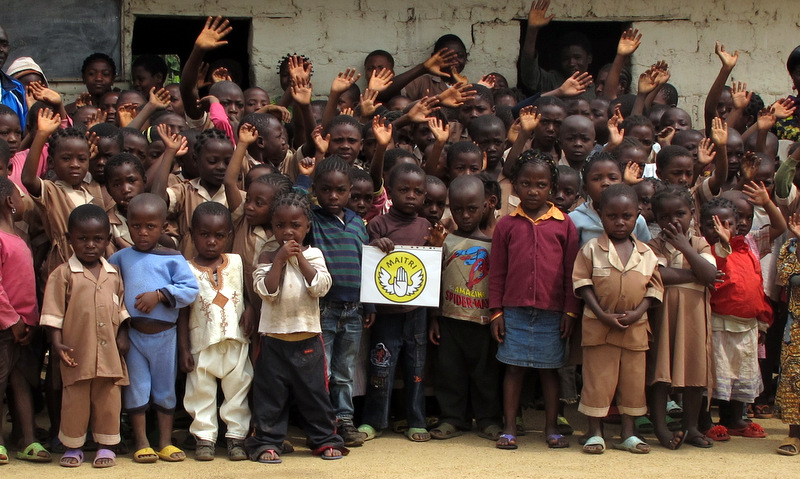
The children from Kengang a small village in Cameroon, sponsored by MAITRI
Parish Communities
Our organization is one of the founding members of the “Polish Council of Catholic Associations”. At the beginning of 2017, there were already 10 active parish communities in the following cities: Gdańsk, Białystok, Warsaw, Lublin, Bytom, Gliwice, Rybnik, Racibórz, Poznań, Wrocław. Each church community has its spiritual guide but also remains in touch with the Bishop of the local diocese. Also communities in Gdańsk and Bytom are regulated by law.
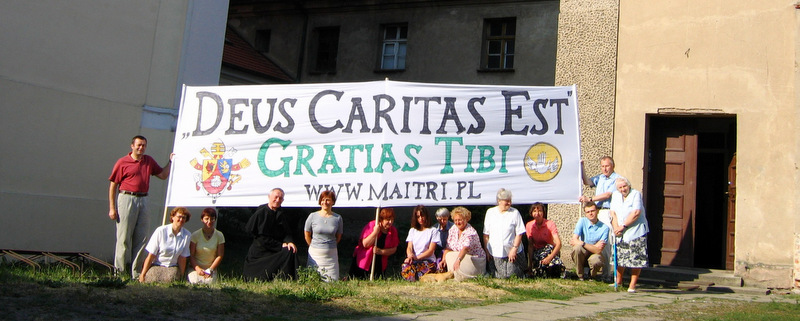
MAITRI Movement representatives with Fr Dr Roman Forycki at the Benedictines Monastery of Lubiń, Poland
Our mission
What motivates us – the vision of MAITRI Movement
We believe in a world. World without hunger, and poverty. World where suffering is not part of everyday life, all human beings are equal and their rights are fully respected.
Our Mission
Our mission is to help the poorest communities, especially children living in poverty in the countries of the Global South, but also around us. We fulfil our mission through:
– charitable activity addressed at ‘real people’ in need – we actually know the names of each person we help,
– humanitarian aid – its effectiveness is ensured through cooperation with Polish missionaries who know local reality and needs,
– promotional and informative activities aimed at Polish society to increase sensitivity to problems inhabitants of the developing countries are faced with.
Through our activity, we fulfil statutory goals of Maitri Movement.
Every day tens of thousands die of starvation
Did you know that almost a fifth of the population of the Earth is poverty stricken, few hundred million of people suffer from famine and every day tens of thousands die of starvation? Among those, a significant part is children. Along the road the humanity strides towards its progress, there are crowds of paupers deprived of the basic means of survival and of human dignity.
Thanks to today’s technology, we can even spot each of them using the satellite’s system. Yet still, our hearts remain blind. We do not notice them. This is why today’s world became a silent witness of a tragedy for which one cannot find a counterpart throughout the history. One of many misfortunes is misery and hunger that affect a big part of the human population. The gap between those pushed into depths of misery and the wealthy societies (which fortunately we are part of), constantly widens. Particularly shameful is the fact that “some nations, where a majority of people pride themselves to be Christian have an abundance of wealth, whereas others are deprived of the necessities of life and are tormented with hunger, disease, and every kind of misery.” (Second Vatican Council, Pastoral Constitution on the Church in the Modern World, 88).
The divisions among people are not a result of bad economic practices or disorganisation of societies. The routes of the problem are in people’s’ hearts. They can be a result of not being able to understand the poor, the situation they are in, its causes. Most often though, the divisions are the result of egoism of individuals, groups or nations, as well as conceit, greed and lust for power no matter the price. They are also deepened by various prejudice, xenophobia, nationalisms or ideologies preaching class, religious or race hatred, etc.
Silenced voice of the heart
The bottom line is that the individual moral attitudes lead to ‘silencing the voice of the heart and consciousness’. In these individual attitudes, unfair social structures are embedded and this allows for this tragic situation to prevail and does not allow any change for better. The change can only take place through a transformation of people’s’ hearts and consciousness. Only this can convince us to open up to problems of today’s world and of those who suffer the most, as well as to decreasing waste and limiting our needs so we can share with the poor.
Who will take responsibility for the Third World?
St. John Paul II in one of his sermons asked us: “And who will take responsibility for the Third World?”. All of us should, as Bible says: “Do not turn your face away from any of the poor. […] If you have great wealth, give alms out of your abundance; if you have but little, do not be afraid to give alms even of that little” (Tb 4,7-8). The MAITRI Movement is a response to his calling.
Our spirituality
Our spirituality
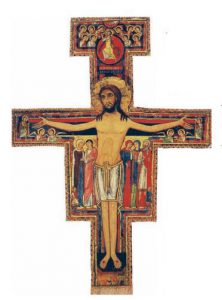
The spirituality of the ‘Maitri’ Movement
The spirituality of the ‘Maitri’ Movement is focused on the suffering Jesus. His tormented body was hung on the cross when Jesus gave his life for each of us. Today He gives us the same body as food in each Holy Mass. The suffering and dying Jesus has also embodied in the poorest whom the Movement members want to serve. His suffering did not end with his death.
Mother Teresa, while receiving the Nobel Prize, said among others. ‘Today there is so much suffering – and I feel that the passion of Christ is being relived all over again’. Do you agree with this? Jesus loved us till the end of His life. But we can show Him our love too. What we would like to have done for Him when He suffered on the cross, we can do today for our suffering brothers. Jesus called from the cross ‘I am thirsty’. Now we can satisfy His thirst. Not only of a drink but mainly of our love – by showing love to our suffering brothers. In this way, Jesus gives us today an opportunity and calls us to receive Him into our hearts and respond with deeds to His gift of Himself. Responding to this call, following Mary, we can accompany Jesus to His cross. Gathering around the cross, close to the suffering Jesus, we can become more and more united with our brothers. Thus, we realise His testament expressed when he prayed to His father, one day before His death: ‘ that they may be one’ (see: John 17: 11,21,22).
Principles of life of ‘Maitri’ Movement members
‘Maitri’ members are guided in their life by the Movement’s principles. Keeping in mind that the Gospel read out according to the teaching of the Church is the basic norm of faith and life. We believe that the ‘Maitri’ Movement is developed and revived by those who:
- limit their expenses and needs in everyday life and share with those living in very poor economic conditions of the developing world;
- respect the dignity of those they help and look for the ways of getting closer to them;
- define the help they offer as a gift of a pure heart;
- promote equality;
- increase awareness of the situation that people of Third World are in, through their actions, statements and the attitude towards life.
Maitri Movement Status
Statut
STATUT RUCHU SOLIDARNOŚCI Z UBOGIMI TRZECIEGO ŚWIATA – MAITRI
Uchwalony jednogłośnie przez uczestników Zgromadzeń Ogólnych 28.06.2003 r. oraz 22.11.2003 w Kaniach Helenowskich.
CHARYZMAT
Charyzmatem ruchu jest wyrażona czynem miłość do ludzi najbiedniejszych. Ten dar łaski pozwala uczestnikom wspólnoty dostrzegać problemy najbiedniejszych. Istnienie tych problemów odczytują oni jako Boże wezwanie skierowane osobiście do siebie i odpowiadają na nie w duchu wiary.
CELE
- niesienie pomocy najbiedniejszym ludziom żyjącym w krajach Trzeciego Świata i wokół nas;
- budzenie wrażliwości sumień i otwieranie ludzkich serc na godność ludzi najbiedniejszych, na ich potrzeby oraz na wartości, którymi oni żyją;
- szukanie dróg pojednania i zbliżenia między żyjącymi w dobrobycie i biednymi.
SPOSOBY WYPEŁNIANIA CELÓW
Wśród sposobów wypełniania celów znajdują się między innymi:
- modlitwa i ofiarowanie cierpień w intencji ludzi biednych; ograniczanie własnych potrzeb i proponowanie skromnego stylu życia;
- utrzymywanie osobistych więzi z ludźmi biednymi poprzez materialną i duchową pomoc;
- upowszechnianie rzetelnego obrazu ludzi żyjących w Trzecim Świecie i wokół nas oraz informowanie o ich problemach;
- wychowywanie dzieci i młodzieży w duchu przyjaźni do najbiedniejszych;
- współpraca z osobami, ruchami i organizacjami realizującymi cele podobne do celów ruchu.
ZASADY ŻYCIA
Podstawową normę wiary i życia uczestników ruchu stanowi Ewangelia odczytywana i rozumiana zgodnie z nauką Kościoła. Zasady ruchu będące wskazówką w kształtowaniu sposobu życia uczestników wynikają z charyzmatu. Zgodnie z nimi ruch Maitri rozwija i ożywia każdy kto:
- ograniczając w życiu codziennym własne wydatki i potrzeby dzieli się z potrzebującymi braćmi żyjącymi w krajach Trzeciego Świata i wokół nas;
- stara się uszanować godność i szukać dróg zbliżenia z tymi, którym pomaga;
- pomoc swoją traktuje jako dar czystego serca;
- czuje się równy z tymi, z którymi się dzieli;
- swoją postawą życiową, słowem i przykładem stara się budzić wrażliwość na los ludzi najbiedniejszych.
FORMACJA
Celem formacji uczestników ruchu jest dojście do pełni życia chrześcijańskiego przez wypełnianie charyzmatu ruchu. Uczestnicy formują się indywidualnie poprzez podjęcie praktyk duchowych zalecanych przez ruch, udział w życiu parafialnej wspólnoty ruchu, w dniach skupienia, rekolekcjach formacyjnych i spotkaniach krajowych ruchu. Formacja zasadniczo obejmuje następujące etapy:
- Wprowadzenie, które obejmuje zapoznanie się ze statutem ruchu oraz z życiem i pracą grupy;
- Formację początkową, czyli uporządkowanie i pogłębienie wiary i życia duchowego, głębsze poznanie charyzmatu ruchu, odkrycie, zrozumienie i przyjęcie swego powołania oraz jego konsekwencji;
- Formację pogłębiającą, czyli ćwiczenie w apostolacie i coraz pełniejszy udział w misji Kościoła, w charyzmacie, życiu i dziele ruchu oraz w odpowiedzialności za wspólnotę, pogłębianie znajomości nauki Kościoła (zwłaszcza społecznej) oraz przygotowanie do podejmowania zadań i funkcji w ruchu.Każdy uczestnik potem bierze udział w formacji stałej, która polega na utrwalaniu poprzednich etapów.
WSPÓLNOTA
Wspólnotę Ruchu tworzy każdy, kto żyje charyzmatem Ruchu, uczestniczy w życiu wspólnoty Ruchu oraz wyrazi wolę przystąpienia do Ruchu w sposób określony w Regulaminie.
Wspólnota Parafialna Ruchu rozwija i upowszechnia charyzmat Ruchu przez modlitwę, organizowanie spotkań formacyjnych, uwrażliwianie na sytuację najbiedniejszych oraz podejmowanie nowych form pomocy biednym. Formę i sposób pełnienia apostolstwa oraz zakres zadań w Parafii i Diecezji członkowie Wspólnoty określają sami w zgodzie z charyzmatem oraz za aprobatą proboszcza lub biskupa. Głównym celem Wspólnoty Parafialnej jest troska o rozpoznanie i rozwijanie powołania chrześcijańskiego jej uczestników na drodze służby najbiedniejszym z biednych.
Cała Wspólnota Ruchu gromadzi się na corocznym Spotkaniu Krajowym, które jest wzajemnym dzieleniem się świadectwem wiary i służby najbiedniejszym. Spotkanie to ma ożywiać charyzmat, umacniać uczestników w ich apostolstwie oraz ma być miejscem wspólnego odczytywania znaków czasu.
STRUKTURA ORGANIZACYJNA WSPÓLNOTY RUCHU
I. WSPÓLNOTA PARAFIALNA RUCHU
- Wspólnotę Parafialną Ruchu tworzą co najmniej trzy osoby.
- Członkami Wspólnoty Parafialnej mogą być uczestnicy Ruchu z różnych diecezji.
- Za działalność i rozwój Wspólnoty Parafialnej odpowiada Rada Wspólnoty, w której skład wchodzą: Odpowiedzialny Wspólnoty, Animator i Skarbnik oraz Duszpasterz, o ile zostanie wyznaczony przez Władzę Kościelną.
- Wspólnota ma prawo używać nazwy Ruchu, jeżeli jest zarejestrowana przez Radę Ruchu. Warunki rejestracji zapisane są w Regulaminie Wspólnoty.
- Wspólnota podejmuje działania statutowe samodzielnie lub we współpracy z innymi Wspólnotami Ruchu oraz w inny sposób określony w Regulaminie.
- Środki materialne, którymi dysponuje Wspólnota, to: składki uczestników Ruchu, darowizny, spadki, zapisy oraz ofiarność publiczna. Przy czym:
a) pozyskiwanie tego majątku i dysponowanie nim w zakresie wynikającym z wypełniania celów Ruchu prowadzone jest wyłącznie we Wspólnotach i jest obowiązkowo księgowane;
b) w każdym wypadku obowiązuje zasada uszanowania intencji ofiarodawcy;
c) zbiórki darów i ofiar w parafiach mogą być prowadzone wyłącznie za zgodą miejscowego proboszcza.
II. RADA RUCHU W DIECEZJI
- Członkowie Rad Wspólnot Parafialnych Ruchu na terenie tej samej diecezji tworzą Radę Ruchu w Diecezji. W skład Rady wchodzi też Duszpasterz Diecezjalny, o ile zostanie mianowany przez Władzę Kościelną.
- Rada działa w sposób ciągły, to znaczy nie ma kadencji.
- Zadania Rady Ruchu w Diecezji:
a) koordynuje działania Ruchu na poziomie diecezji;
b) składa pisemne sprawozdania właściwemu Biskupowi.
- W przypadku, gdy na terenie diecezji funkcjonuje tylko jedna Wspólnota Parafialna Ruchu, to przejmuje ona zadania Rady Ruchu w Diecezji.
III. ODPOWIEDZIALNY RUCHU W DIECEZJI
- Rada Ruchu w Diecezji wybiera spośród swoich członków Odpowiedzialnego Ruchu w Diecezji na okres 3 lat.
- Zadania Odpowiedzialnego Ruchu w Diecezji:
a) przygotowuje i prowadzi Radę Ruchu w Diecezji;
b) w kontaktach z Władzami Kościelnymi reprezentuje stanowisko wypracowane przez Radę Ruchu w Diecezji.
- W przypadku, gdy na terenie diecezji funkcjonuje tylko jedna Wspólnota Parafialna Ruchu, funkcje Odpowiedzialnego w Diecezji wypełnia Odpowiedzialny tej Wspólnoty.
IV. RADA RUCHU
- Rada Ruchu składa się z Odpowiedzialnych Ruchu w Diecezjach, Głównego Animatora i Duszpasterza Krajowego.
- Rada działa w sposób ciągły, to znaczy nie ma kadencji.
- Rada spotyka się co najmniej 2 razy w roku.
- Spotkania Rady przygotowuje i prowadzi Główny Odpowiedzialny.
- Zadania Rady Ruchu:
a) wytycza i koordynuje kierunki działania całego Ruchu i czuwa nad przestrzeganiem Statutu i Regulaminów;
wybiera spośród swoich członków i odwołuje Głównego Odpowiedzialnego oraz głosuje nad jego absolutorium;
c) zatwierdza wszystkie Regulaminy obowiązujące w Ruchu;
d) rozpatruje sprawozdania roczne Wspólnot Parafialnych Ruchu;
e) dla celów rejestracji orzeka o zgodności i realizacji celów statutowych organizacji współpracujących ze Wspólnotami Parafialnymi Ruchu z celami Ruchu;
f) zwołuje i przygotowuje Spotkania Krajowe i Zgromadzenia Ogólne oraz ustala harmonogram innych spotkań Ruchu na poziomie krajowym;
g) w razie potrzeby Rada może na czas określony przekazać część swoich uprawnień Głównemu Odpowiedzialnemu lub innym osobom.
h) składa pisemne sprawozdania Ogólnopolskiej Radzie Ruchów Katolickich i Asystentowi Episkopatu ds. Ruchów.
- W sprawach dotyczących Regulaminów, kierunków działania i Głównego Odpowiedzialnego Rada podejmuje decyzje większością 2/3 głosów w obecności 3/4 swoich członków. W pozostałych sprawach wymagana jest zgoda 2/3 głosów w obecności 2/3 członków Rady.
- W nadzwyczajnych okolicznościach Radę Ruchu zwołuje 2/3 jej członków.
V. GŁÓWNY ODPOWIEDZIALNY
- Główny Odpowiedzialny wybierany jest przez Radę Ruchu na okres 3 lat. Może być wybierany na dwie kolejne kadencje.
- Zadania Głównego Odpowiedzialnego:
a) reprezentuje stanowisko wypracowane przez Radę Ruchu w kontaktach z Władzami Kościelnymi;
b) prowadzi pisemny rejestr Wspólnot Parafialnych Ruchu;
c) prowadzi pisemny rejestr organizacji założonych przez uczestników Ruchu oraz organizacji, z którymi uczestnicy formalnie współpracują;
d) zwołuje i prowadzi Radę Ruchu.
e) podejmuje decyzje w imieniu Rady Ruchu w ramach jej zadań, które podlegają weryfikacji na najbliższym spotkaniu Rady.
VI. GŁÓWNY ANIMATOR
- Głównego Animatora wybierają spośród siebie Animatorzy Wspólnot Parafialnych Ruchu na okres 3 lat.
- Zadania Głównego Animatora:
a) odpowiada za formację Animatorów i animację spotkań na poziomie krajowym.
b) w porozumieniu z Radą Ruchu ustala harmonogram spotkań formacyjnych na szczeblu krajowym;
c) ściśle współpracuje z Duszpasterzem Krajowym przy ustalaniu programu formacji w Ruchu;
d) składa sprawozdanie roczne Radzie Ruchu.
VII. SPOTKANIE KRAJOWE
- W Spotkaniu Krajowym biorą udział uczestnicy i współpracownicy Ruchu, jego duszpasterze i zaproszeni goście.
- Do stałych elementów Spotkania Krajowego zgodnie z tradycją należą:
- Eucharystia i modlitwa;
- pogłębienie formacji;
- wymiana doświadczeń uczestników i współpracowników;
- zaproszenie przedstawicieli misjonarzy, z którymi współpracujemy;
- dzielenie się doświadczeniami życia charyzmatem.
VIII. ZGROMADZENIE OGÓLNE
- Zgromadzenie Ogólne zwoływane jest przez Radę Ruchu w celu zatwierdzenia Statutu i ewentualnych zmian w Statucie Ruchu.
- Prawo głosu w Zgromadzeniu Ogólnym mają:
a) zarejestrowani uczestnicy Ruchu i duszpasterze o stażu uczestnictwa co najmniej 3 lat;
b) aktualni członkowie Rad Wspólnot Parafialnych.
3. Uchwały Zgromadzenia Ogólnego podejmowane są większością 3/4 głosów w obecności co najmniej 3/4 uprawnionych uczestników w I terminie. W przypadku braku kworum w I terminie Rada Ruchu zwołuje Zgromadzenie Ogólne w II terminie, na którym uchwały podejmowane są niezależnie od liczby obecnych uczestników.
Kanie Helenowskie 22.11.2003
Weronika Musioł – Racibórz
Edyta Ostrowska – Białystok
Krzysztof Starczewski – Gdańsk
Danuta Szczepańska – Bytom
Henryk Wardak – Warszawa
Piotr Obuch-Woszczatyński – Warszawa
Edyta Hinkielman – Wrocław
Jan Łucki – Wrocław
Marek Oktaba – Wrocław
Róża Sternik – Lublin
Teresa Głowacka – Lublin
Barbara Mielecka – Lublin
Elżbieta Salwerowicz –Rawa Mazowiecka
Jacek Wójcik – Warszawa
Local Communities
Church Partnerships
Church Partnerchips
The Maitri Movement operates in the partnership with the Polish Catholic institutes. Currently, 23 missionary centres and congregations are cooperating with Maitri in the following countries: Rwanda, DR Congo, Congo-Brazzaville, Burundi, Cameroon, Sudan, Central African Republic, Togo, Madagascar, Ivory Coast, Republic of Chad, Uganda, Bolivia, Syria. Please see below the list of all the missionary centres and congregations cooperating with Maitri.
The Congregation of the Sisters of the Holy Angels
City: Konstancin Jeziorna
Country: DR Congo
Missionary Centre: Ntamugenga (Have a Heart Adoption)
Country: Rwanda
Missionary Centre: Kabuga (aid projects)
Missionary Centre: Nyakinama (Have a Heart Adoption)
Country: Cameroon
Missionary Centre: Esseng (Have a Heart Adoption)
The Dominican Sisters
City: Kraków
Country: Cameroon
Missionary Centre: Bertoua/ Garoua Boulay (Have a Heart Adoption)
The Congregation of the Sisters of Saint Michael the Archangel (Michaelite Sisters)
City: Warszawa
Country: Cameroon
Missionary Centre: Nguelemendouka, Betare-Oya (aid projects)
The Congregation of the Sisters of the Most Holy Soul of Christ the Lord
City: Kraków
Country: Cameroon
Missionary Centre: Abong-Mbang, Djouth (Have a Heart Adoption)
The Dominican Friar (cooperation up to 2011)
City: Warszawa
Country: Cameroon
Missionary Centre: Bertoua/Yaounde (aid projects)
The Congregation of the Sisters of the Holy Spirit de Saxia
City: Kraków
Country: Burundi
Missionary Centre: Bujumbura, Buraniro, Gatara (Have a Heart Adoption)
The Congregation of the Sisters of the Franciscan Servants of the Cross
City: Warszawa
Country: Rwanda
Missionary Centre: Kibeho (Have a Heart Adoption)
The Congregation of the Sisters of St. Joseph
City: Kraków
Country: Congo-Brazzaville
Missionary Centre: Brazaville, Gamboma, Oyo (Have a Heart Adoption and other aid projects)
Country: DR Congo
Missionary Centre: Kinszasa (Have a Heart Adoption)
Country: Cameroon
Missionary Centre: Njombe (aid projects)
Missionary Centre: OMVAN (Have a Heart Adoption)
The Congregation of the Carmelite Sisters of the Infant Jesus
City: Sosnowiec
Country: Burundi
Missionary Centre: Gasura; Gitega (aid projects)
Country: Cameroon
Missionary Centre: Dimako (aid projects)
The Congregation of the Devout Virgins of St Catherine, Virgin and Martyr
City: Orneta
Country: Togo
Missionary Centre: Guerin-Kouka, Biankouri-Dapaong, Sokode, Pagouda (Have a Heart Adoption)
The Congregation of Marian Fathers MIC
City: Warszawa
Country: Cameroon
Missionary Centre: Atok (aid projects)
The Congregation of the Sisters of Divine Providence
City: Raszyn
Country: Cameroon
Missionary Centre: Ayos, Essiengbot (Have a Heart Adoption)
The Society of the Catholic Apostolate – The Pallottines
City: Warszawa
Country: Rwanda
Missionary Centre: Kabuga (Have a Heart Adoption)
Country: Ivory Coast
Missionary Centre: Grand Bereby (Have a Heart Adoption)
The Congregation of the Missionary Sisters of the Catholic Apostolate – The Pallottines
City: Warszawa
Country: Rwanda
Missionary Centre: Kigali –Gikondo, Masaka, Ruhuha, Butare, Ruhango (Have a Heart Adoption)
Missionary Centre: Kibeho (aid projects)
Country: Cameroon
Missionary Centre: Doume, Bafoussam, Nkol-Avolo, Yaounde (Have a Heart Adoption and other aid projects)
Country: DR Congo
Missionary Centre: Rutshuru, Goma-Keshero (Have a Heart Adoption and other aid projects)
The Passionist Sisters – The Sisters of the Cross and Passion of our Lord Jesus Christ
City: Płock
Country: Cameroon
Missionary Centre: Bertoua-Enia, Ndelele, Bertoua-Tigaza; Yaounde (Have a Heart Adoption)
The Salesian Sisters – The Daughters of Mary Help of Christians
City: Łomianki
Country: Sudan
Missionary Centre: Hilla Mayo, Wau (Have a Heart Adoption)
The Society of Jesus – The Jesuits
City: Kraków
Country: Madagascar
Missionary Centre: Fianarantsoa, Amparibe (Have a Heart Adoption)
The Order of Friars Minor Capuchin
City: Kraków
Country: Central African Republic
Missionary Centre: Ndim, Bocaranga (aid projects)
The Congregation of the Missionary Sisters Servants of the Holy Spirit
City: Racibórz; Kopiec
Country: Togo
Missionary Centre: Yaounde, Lomé (Have a Heart Adoption)
The Congregation of the Sisters of the Immaculate Conception of the Blessed Virgin Mary
City: Katowice
Country: Cameroon
Missionary Centre: Mandama, Mokolo, Tchollire (Have a Heart Adoption and other aid projects)
The Daughters of Divine Love Congregation
City: Kraków
Country: Uganda
Missionary Centre: Rushooka (Have a Heart Adoption and other aid projects)
The Congregation of the Sisters of the Holy Spirit
City: Racibórz
Country: Boliwia
Missionary Centre: Coripata, Cochabamba (Have a Heart Adoption and other aid projects)
The Franciscan Sisters of the Sacred Heart
City: Rome
Country: Central African Republic
Missionary Centre: Maigaro (aid projects)
The Congregation of Our Lady of Charity of the Good Shepherd
City: Piaseczno
Country: Central African Republic
Missionary Centre: Bouar, Ngoundaye (aid projects)
Diocese Doume – AbongMbang
City: Doume
Country: Cameroon
Missionary Centre: Doume, Bertoua (Have a Heart Adoption and other aid projects)
Diocese Lai
City: Lai
Country: Republic of Chad
Missionary Centre: Lai (Have a Heart Adoption Disabled Children)
Diocese Aleppo
City: Aleppo
Country: Syria
Missionary Centre: Latin Parish of St. Francis (Have a Heart Adoption Disabled Children and other aid projects)

